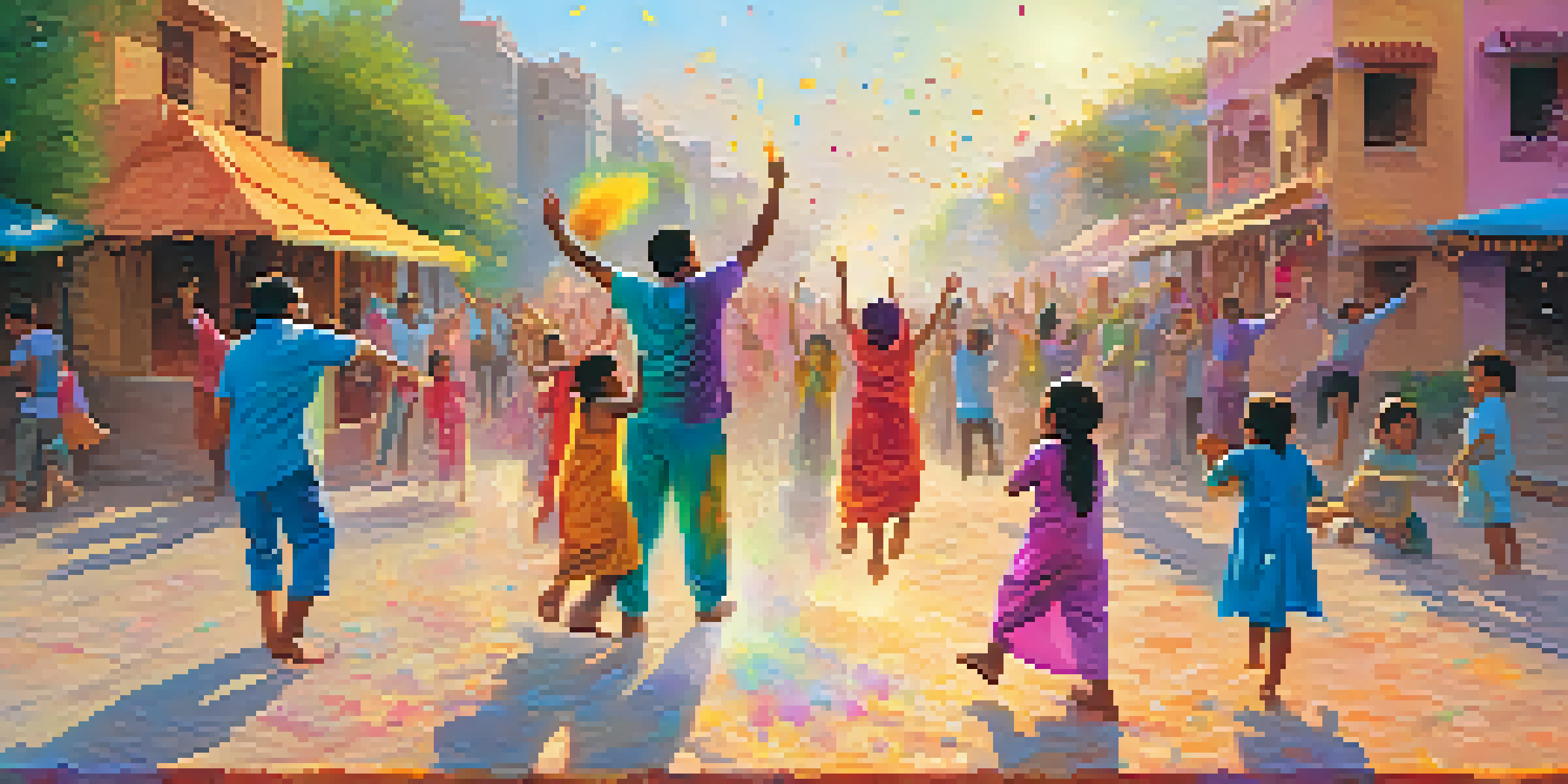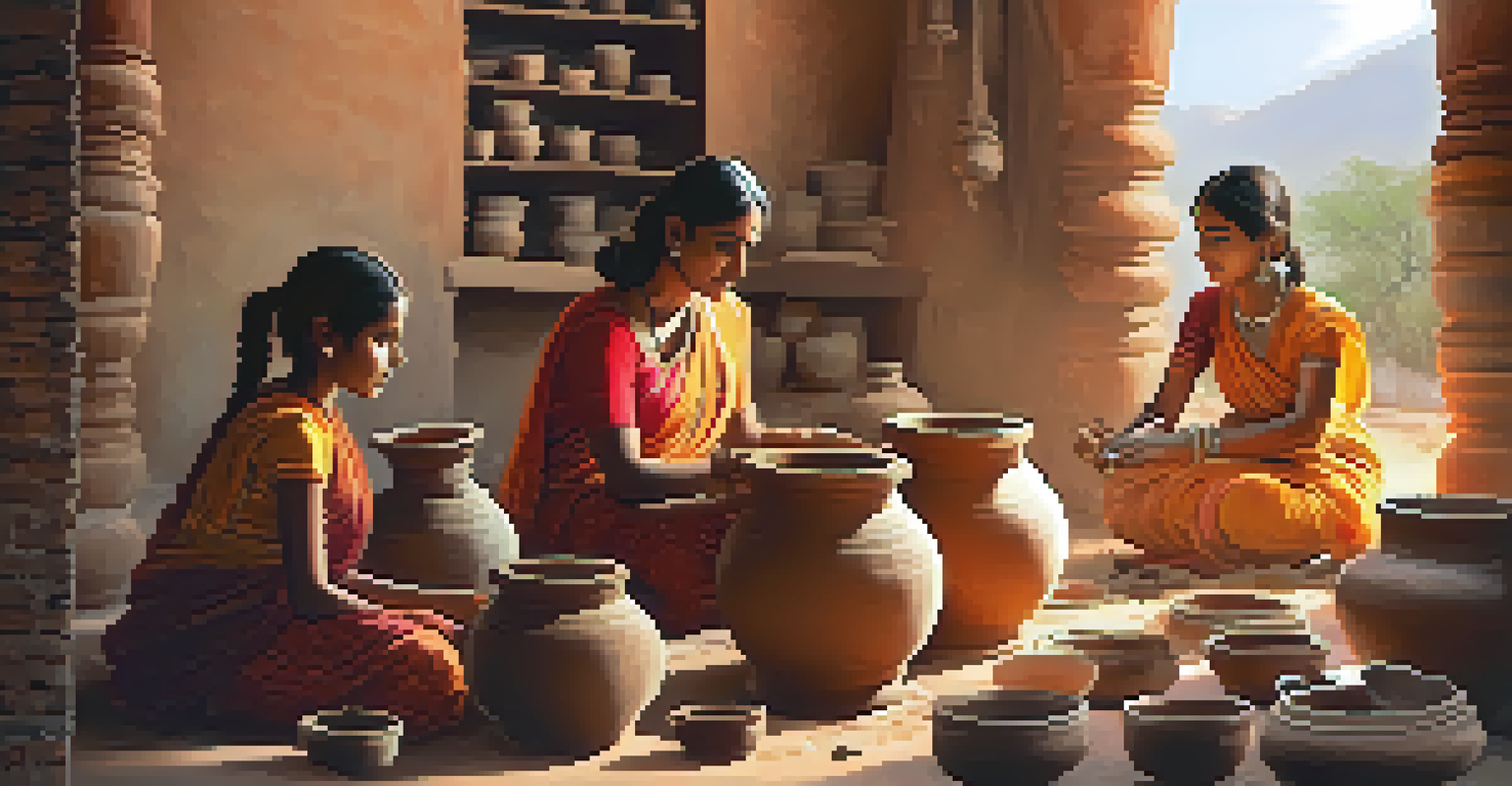Cultural Experiences for Families Traveling in India

Immerse in Traditional Indian Festivals with Your Family
India is renowned for its vibrant festivals that are celebrated with great enthusiasm. Families can immerse themselves in events like Diwali, where the streets are lit with diyas, or Holi, the festival of colors, which invites people to play with hues and water. Participating in these celebrations allows families to experience the country's rich traditions firsthand.
Traveling – it leaves you speechless, then turns you into a storyteller.
Kids will love the excitement of Holi, where they can throw colored powders and splash water on their friends and family. Meanwhile, Diwali teaches them about the significance of light over darkness, as they help decorate the house and create beautiful rangoli designs. These festive experiences create unforgettable memories and foster a deeper understanding of Indian culture.
In addition to the fun, these festivals often include local music and dance, giving families a chance to learn traditional arts. Whether it’s dancing to dhol beats or listening to folk stories, engaging in these cultural practices helps children appreciate diversity and the significance of community.
Explore India’s Rich Heritage through Local Museums
Visiting museums in India can be an exciting journey through history for families. Places like the National Museum in New Delhi or the Chhatrapati Shivaji Maharaj Vastu Sangrahalaya in Mumbai offer a glimpse into India’s past, showcasing artifacts that tell fascinating stories. These museums often have interactive exhibits designed to engage children and make learning fun.

For example, the Children’s Museum in Kolkata encourages young minds to explore through play, making it an ideal stop for families. Kids can participate in various activities, from arts and crafts to science experiments, all while learning about Indian culture and history. This hands-on approach keeps their curiosity alive and encourages critical thinking.
Celebrate Vibrant Indian Festivals
Families can immerse themselves in the rich traditions of India by participating in lively festivals like Diwali and Holi.
Moreover, many museums in India offer guided tours that cater to families, ensuring that both adults and children can enjoy the experience together. As you walk through ancient relics and stunning art, it's a perfect opportunity for parents to spark conversations about history and heritage with their kids.
Participate in Traditional Arts and Crafts Workshops
India is a treasure trove of artistic traditions, and families can dive into hands-on experiences through local workshops. From pottery in Rajasthan to weaving in Varanasi, these activities provide children with a chance to learn ancient crafts while having fun. Not only do these workshops nurture creativity, but they also connect families with local artisans.
The best way to find yourself is to lose yourself in the service of others.
For instance, in Jaipur, families can join block printing workshops where they can create their own fabric designs. This immersive experience allows children to appreciate the effort that goes into traditional crafts, fostering respect for skilled artisans. It’s a beautiful way to bond as a family while learning a new skill together.
Additionally, these workshops often include storytelling elements that reveal the cultural significance behind each craft. This blend of creativity and education makes for a memorable outing that enriches your family’s travel experience in India.
Discover the Culinary Diversity of Indian Cuisine
India’s culinary landscape is as diverse as its culture, making it a delightful adventure for families. Engaging in cooking classes or food tours allows families to explore regional dishes and learn about their origins. Kids will relish the opportunity to get hands-on in the kitchen, creating iconic dishes like butter chicken or dosa.
Taking a family-friendly cooking class in cities like Delhi or Chennai can be an exciting way to bond over food. Children can take part in the preparation, from chopping vegetables to mixing spices, while parents can enjoy the culinary experience. This not only teaches kids about flavors but also encourages them to appreciate different cuisines.
Explore History at Local Museums
Visiting museums offers families interactive experiences that spark curiosity and teach about India's diverse heritage.
Moreover, food tours often include visits to local markets, where families can shop for fresh ingredients and learn about spices. This immersive experience opens up conversations about health, nutrition, and the importance of local produce, making it both an educational and delicious outing.
Experience the Spiritual Vibes of India’s Sacred Sites
India is home to numerous sacred sites that offer families a glimpse into the country’s spiritual heritage. From the serene banks of the Ganges in Varanasi to the majestic Golden Temple in Amritsar, visiting these places can be a profound experience. Families can learn about various religions and the values they promote, fostering an environment of respect and understanding.
At these sites, children can witness daily rituals, participate in community prayers, and even engage in volunteer activities. Experiencing the tranquil atmosphere can encourage discussions about empathy, kindness, and the importance of mindfulness in daily life. It’s an enriching opportunity for families to bond over shared spiritual experiences.
Additionally, many sacred sites offer workshops or guided tours that cater to families, helping them understand the cultural and historical significance of each location. This blend of education and spirituality can provide lasting impressions and instill values of tolerance and appreciation for diversity.
Embark on Nature Trails and Wildlife Safaris Together
India’s diverse landscapes offer families the chance to explore nature through exciting trails and wildlife safaris. National parks like Ranthambore and Kaziranga are perfect for spotting unique wildlife, including tigers and rhinoceroses. Children will be thrilled by the prospect of seeing these magnificent creatures in their natural habitat, creating unforgettable memories.
Going on a safari can also be an educational experience, as families learn about conservation and the importance of protecting wildlife. Many parks offer guided tours led by knowledgeable naturalists who can share stories about the local ecosystem, fostering a sense of responsibility towards nature in young minds.
Engage in Hands-On Cultural Activities
Participating in traditional arts, crafts workshops, and cooking classes allows families to connect with local artisans and cuisine.
Moreover, nature trails often include fun activities like bird-watching and identifying local plants. These experiences encourage families to appreciate the beauty of the outdoors while promoting physical activity and environmental awareness—a perfect blend for family adventures.
Engage with Local Communities for Authentic Experiences
One of the best ways for families to experience India is by engaging with local communities. Participating in community-based tourism initiatives allows families to interact with locals, learn their customs, and even stay in homestays. This authentic connection brings a deeper understanding of Indian culture and fosters respect for different ways of life.
For instance, in rural areas, families can join in daily activities like farming, cooking, or traditional crafts. This hands-on engagement not only provides a unique perspective on local lifestyles but also helps children develop empathy and appreciation for hard work. It’s a beautiful way to bond as a family while embracing the spirit of hospitality.

Additionally, many community projects focus on sustainability and preserving local traditions, which can inspire families to think about their own impact on the world. By supporting local artisans and participating in cultural exchanges, families can contribute positively to the communities they visit, making their travel experience even more meaningful.